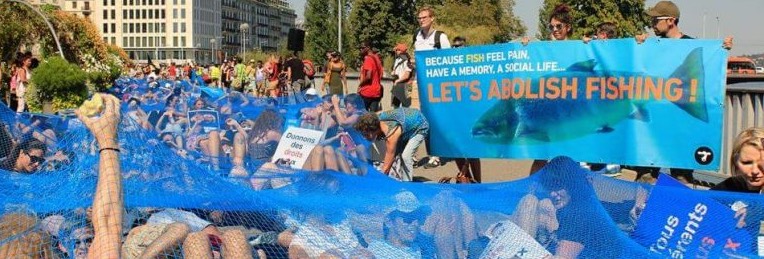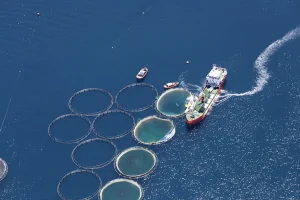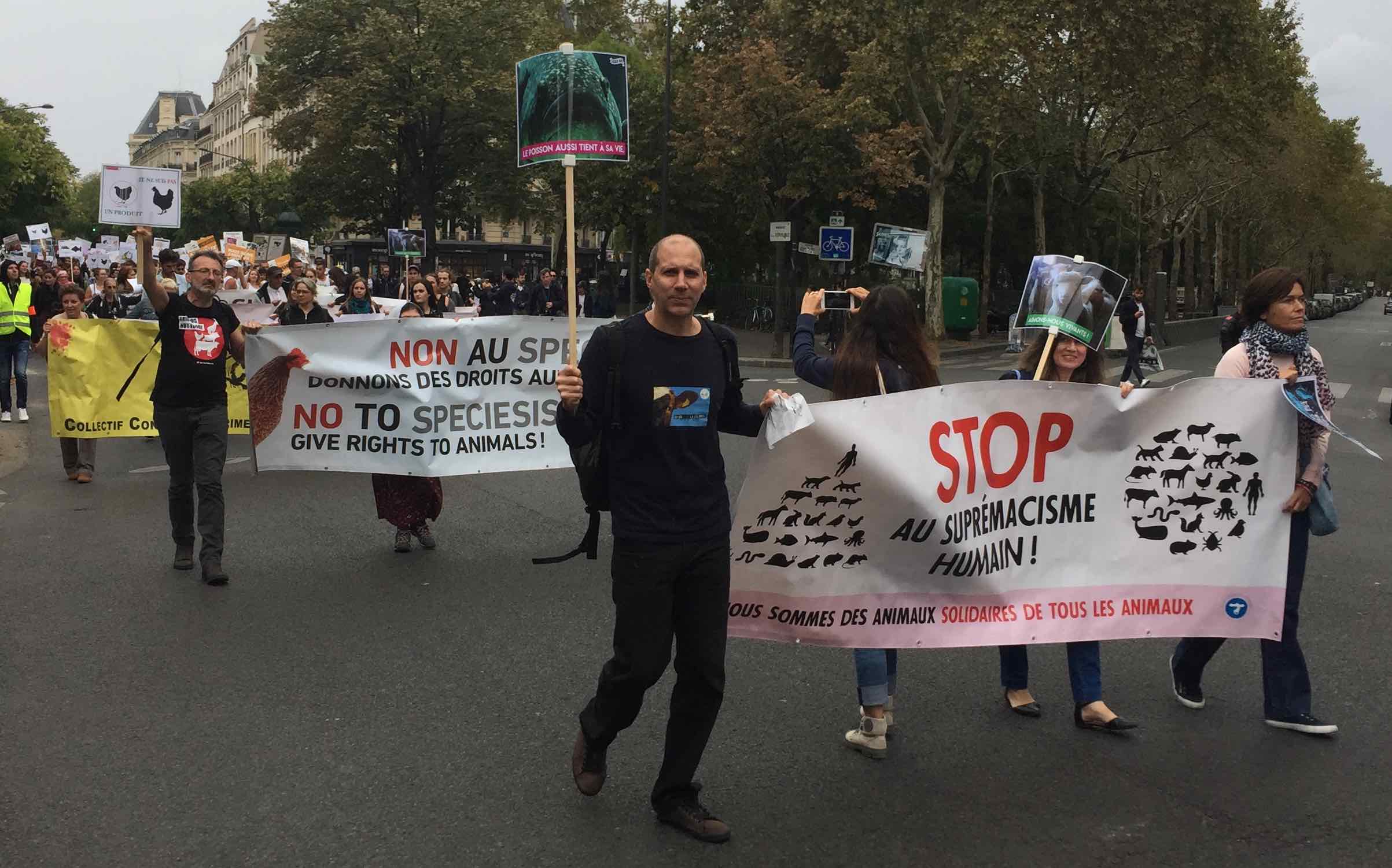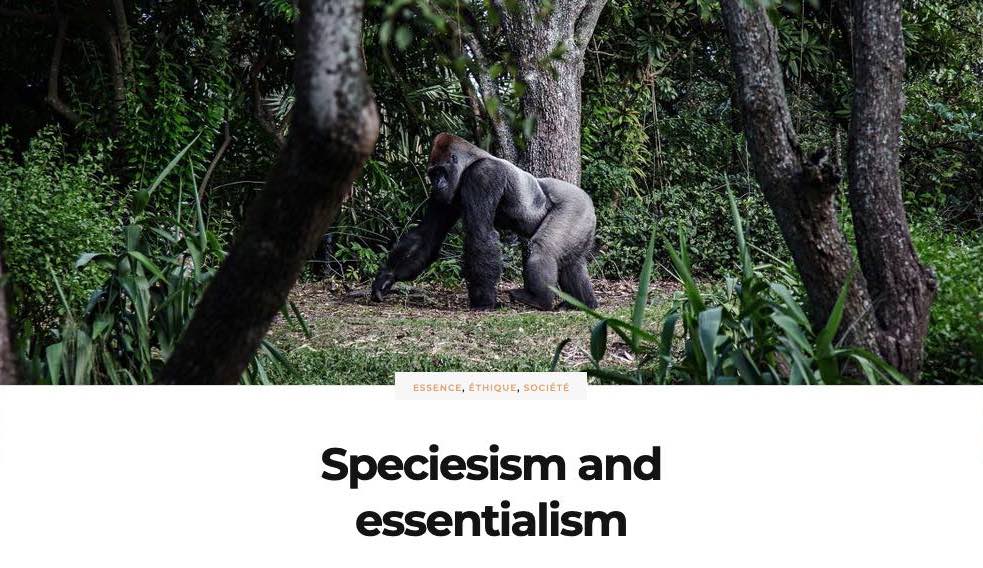We present the main themes of this site in this section, each major theme illustrated by several articles and videos.
* *
*
Speciesism:
discrimination, material oppression, and ideology
Unfair and indefensible discrimination
It was not until 1975 that a systematic and intelligible attack against the founding principles of animal exploitation began to make an impact, with the publication of Peter Singer’s book Animal Liberation. The book had a great impact and sparked an immediate debate: it defended the revolutionary idea that it was nothing more than a form of arbitrary discrimination that has allowed us not to extend the principle of equality from humans to other animals.
The argument for extending the principle of equality beyond the boundaries of our species is based on the same logic that opposes racism, sexism, and other arbitrary discriminations between humans. When we say that all humans are equal, we are not referring to any “real” equality, because humans are undoubtedly different in their physical appearance and strength, but also their abilities and sensibilities greatly vary. The principle of human equality is not a description of reality: it is rather a prescription for how humans should be treating each other.
If the ‘boundary’ that determines whether to give equal consideration to a being’s interests cannot be based on their sex or skin color, how can it be based on whether they walk upright or on all fours, or have fur or not? And if being more intelligent does not allow one human to exploit another, how could it allow humans to exploit non-humans?
The principle of equality must apply to beings that possess interests, understood as the capacity to feel pain or pleasure, and only to them. To extend it beyond this limit of sentience is absurd, to restrict it below it will in any case be arbitrary. If a being suffers, there can be no moral justification for refusing to consider his suffering.
Regardless of race, sex, and species, therefore, the suffering and pleasure of every being must be treated with equal consideration. A society that gives greater weight, when conflict occurs, to the interests of members of a particular race is racist. A society that gives greater weight, when conflict occurs, to the interests of members of a particular species is speciesist.
Equal consideration does not mean equal treatment: if an animal does not suffer from not being able to leave a country, but a human does, the treatment will be different. But where interests exist and are similar, they must be weighed on the same scales. The interest in not being used in an experiment or chained for life in a box, in not being torn away from its mother, in not living locked up in a cupboard, is for example very similar for humans and other animals.
On this topic, see:
- Animal Equality and Speciesism
- The Montreal Declaration on Animal Exploitation (Oct. 2022)
- What is Speciesism?
- Abortion and animal liberation
- Feminism and animal rights
- On superiority
- Animals storming heaven
- Homo Herbivorus (video)
Material oppression and the ideology that reinforces it
Our societies are based on animal exploitation, both materially and ideologically. Materially, since historically we have exploited both the strength of animals, their labor force (for plowing, draught, riding, hunting…) and their productions (their flesh, hair, bones or teeth, their leather or skin, their offspring, their eggs, or their milk…). At the same time, we have also exploited them ideologically, removing their importance and granting ourselves a supposedly infinite value. Our power and our domination over them have allowed us to conceive ourselves as masters of the world, kings of the universe, lords of the earth. Indeed, we see ourselves as superior beings, sole possessors of a right to life (inherent to our special nature), and possessors of a right over the life and death of any other sentient being, of a right to use and abuse them as we please. We have developed a highly valued view of ourselves as predators, and even as super-predators. We see ourselves as the crowning glory of creation, enthroned at the top of a food pyramid, etc.
This speciesist ideology is based on the mystical ideas of Nature (naturalism) and the nature of things and beings (essentialism). Naturalism is the belief that two separate worlds exist: on the one hand, the world of humans, the world of mind and culture, the realm of freedom and individuality, of intelligence and reason, of education, of history and linear progress. On the other hand, the world of ‘nature’, world of matter, of determinism and order, world of drives and instincts, world where beings are defined by their function in a whole, world of circularity. It is the belief that the ‘natural’ world is ordered or balanced and must be revered and safeguarded as such, that each ‘natural element’ holds a specific place in it and performs a precise function in the ‘order of things’. Its place and function would be assured by its own “nature”, its essence. However, French-speaking anti-speciesists assert that essences do not exist, that the natural order does not exist either, and that there is no more Nature to be revered than there is a God to be adored.
This twofold ideology (humanist/naturalist) allows us to consider that animals, slaves to their impulses and instincts, are bodies, organisms, ‘beings of nature’ (instead of being like ‘us’, humans, subjectivities, spiritual beings, ‘beings of freedom’) are therefore things at our disposal in the same way as stones or plants are. It also has allowed, over the centuries, to consider entire categories of humans as things as well, conveniently considered as more ‘natural’ beings: women, children, slaves, colonized peoples, etc.
Various texts translated to English on this website are precisely meant to clarify these questions:
- – Doing away with the concept of Nature, back to ethics and politics
- – What is Speciesism?
- – Appropriation and the concept of Nature
- – Humanism and the promotion of a natural order
- The Psychology of Speciesism (social psychology studies)
- Devaluing Animals, “Animalistic” Humans, and People who Protect Animals (social psychology studies)
- – The myth of species
Fighting speciesism
In France, Switzerland and Quebec, the animal rights movement has developed in a slightly different way than in other “western” countries. It has seen a lively group of essayists, theorists and grassroots activists explicitly claim to be fighting against speciesism, systematically emphasizing this concept, with arguments similar to those put forward by Peter Singer. This has resulted in a movement that clearly demands the abolition of meat (the closing down of slaughterhouses and the end of fishing) and the end of speciesism. In general, few are the organizations and collectives that do not refer, in one way or another, to the question of speciesism, and that do not make it clear that they are in favor of abolishing slaughterhouses. Activists have emphasized the production and consumption of animal flesh as the central material and symbolic practices of human supremacy that needs to be dismantled.
This situation in the ‘Western’ French-speaking world1 is partly due to the fact that, in 1990, French activists created a review that was both theoretical and militant, dedicated to challenging speciesism and exploring its consequences from a cultural, philosophical, ethical, scientific and political point of view. This journal, Les Cahiers antispécistes, which published more than three hundred articles in thirty years, served as a theoretical anchor for many activists and allowed the emergence of a plural political movement that explicitly calls itself anti speciesist (and sometimes, vegan anti speciesist). While the journal ceased publication in 2019, a Franco-Quebecois journal was launched in 2018, entitled L’Amorce, revue contre le spécisme. Another online journal also exists in French: the Swiss journal Antispéciste.ch. These journals play a fundamental role in the ideological formation of the movement.
Since the 1990s, week-long gatherings aimed at reflection have been held on an annual basis. They have included conferences, participatory debates, and have been open with close to no censorship to all the actors of the animal rights movement2. This has allowed the movement to consolidate and the actors to get to know and recognize each other, to point out their divergences and convergences.
For example, the Estivales de la question animale, which exist since 2002 but were preceded by anti-speciesist reflection campsites, or the Semaines de la pensée antispéciste (Weeks of anti-speciesist thought) that take place in various French cities. These regular, free meetings have enabled the emergence of studies and initiatives from a wide variety of organizations and groups, such as the movement for the abolition of meat, the critique of naturalism and humanism, animal rights associations such as L214 or the Parti Animaliste in France, or PEA – Pour l’Egalité animale in Switzerland, etc.
The means of the cultural battle
We publish texts that deal with various cultural strategies that we consider important. What do we call a ‘cultural battle’? It is an endeavor to change the representations of our societies and the affects that are linked to them. It is not really about educating people, but about changing the way our society approaches a range of subjects, such as the relationship between ‘man’ and ‘animal’ (we put inverted commas around it, precisely because such a formulation is problematic), the way our culture accounts for the problems we face and want to solve. The crucial difference between cultural battle and education can perhaps be illustrated by the following anecdote and the reflection it has provoked:
Why differentiate between convincing individuals and changing their culture? The reason is that these two strategies do not operate on the same scale: cultural change cannot be reduced to a series of individual changes. Here goes an example: when I started campaigning for animal equality thirty years ago, people almost invariably said: “But animals don’t suffer!”. Five years ago, I realized that I hadn’t heard that sentence for years. Without me even realizing it, without anyone else realizing it, it had disappeared from the register of what is socially and culturally conceivable (unfortunately, this false belief continues to be invoked in relation to fish and invertebrates). Today, to claim that animals (terrestrial vertebrates) do not suffer is no longer acceptable and no one would dare to do so! Whatever the reasons for this important change are (this is not the point here), it illustrates what a cultural change is. If we take only France as a reference (but the phenomenon is probably worldwide), it is not about a few hundred, thousands or tens of thousands of people changing their minds individually. It is 70 million people who, without even realizing it, no longer have the same representation of animals as thirty years ago and no longer react in the same way. They did not need to be convinced or influenced one by one, and they were not aware that they were changing their views; simply, the culture in which they live has changed. Margaret Mead is often quoted as saying: “Never doubt that a small group of thoughtful, committed, citizens can change the world. Indeed, it is the only thing that ever has.” I am sure that she was not thinking of a small group behind a coup, but of people working hard to change their society’s culture!3
In short, a cultural battle aims to act directly at the societal level, through action and media campaigns that globally change our relationship to animals, humanity, oppression, etc. Examples of cultural battles in the French-speaking world (with varying degrees of success) include:
- – The demand for the abolition of meat and livestock farming
- – The demand for the end of fishing and farming of aquatic animals
- – Politicizing the animal question
- – Depreciating humanism
- – The battle for the eradication of the idea of nature
The demand for the abolition of meat and livestock farming
The practice at the heart of animal suffering is farming for food. This is not only because we are all directly responsible for it through our daily consumption of meat, but also because the idea that an animal’s life matters less than the pleasure of eating a dish is the greatest obstacle to attributing value to members of other species. Meat and fish consumption outnumbers all other forms of animal exploitation in terms of the number of victims it produces. An interesting lead, generally left aside by the animal rights movement and social psychology research, is the question of the symbolic importance of meat consumption: why don’t we want to give it up ? It might be explained by the fact that meat is a symbol of human supremacism, of our domination over the world and, therefore, of the fact that we are exceptional beings, superior beings. In short, the fact that we do not want to give up on meat might be linked to a fundamental identity, the human identity, seen as an identity of domination (in the same way that the male, adult, or white identity are identities of domination, defined as opposed to female, child, non-white, identities, etc.).
The demand for the abolition of meat and livestock farming need not even be based on a rejection of speciesism, since it can follow from the fairly uncontroversial premise that one should not cause suffering or kill an animal unnecessarily. So it does not have to be called strictly speaking an antispeciesist strategy. But the argument is undoubtedly reinforced if one aknowledges that eating animals is indeed a speciesist practice, one that hammers home to each and every one of us a symbolic order whereby humans may eat other animals because they are superior.
While this is not a strategy that needs to be pursued explicitly in the name of a fight against speciesism, calling for a ban on the practice of consuming animal flesh is still tantamount to attacking a central symbolic practice of speciesism – a practice that hammers home to each and every one of us a symbolic order of the speciesist world.
To read further about this question:
- Taste and murder
- Meat consumption and domination marking
- The Montreal Declaration on Animal Exploitation (Oct. 2022)
- Meat Abolition, or the Closing down of All Slaughterhouses
- For the closing down of all slaughterhouses

Veggie Pride March, Geneva, 2013
The demand for the end of fishing and farming of aquatic animals
Aquatic animals (as well as most invertebrates) are the victims of a form of speciesism that is different from the one terrestrial vertebrate animals (mammals, birds, reptiles) endure. If terrestrial animals appear as inferior beings, they nevertheless remain partners of some sort (to be dominated, hunted, loved, bred, exterminated, etc.): they face us. Aquatic animals (or invertebrates) appear to us almost as plants or mere matter, i.e. as non-existent: fishing is deemed to be a peaceful activity; in French we speak of seafood as “sea fruits” (fruits de mer). In Spanish, fish farming practices are called piscifactorías (implying that fishes4 are objects produced in factories) or piscicultura (implying that fishes are cultivable, that they are like fruits that we pick from a tree, or cultivated vegetables). In fact, we count the fishes caught in tons (millions of tons) and not in individuals, etc.
Also, their conditions of capture, breeding and reproduction are not the same. Indeed, the conditions under which they are caught, farmed and killed are not even regulated by law, and are among the most abominable in the world. Their sheer numbers should make the rest of animal exploitation seem anecdotal: while between 70 and 80 billion vertebrate land animals are killed each year in slaughterhouses around the world, it is estimated that between 970 and 3,000 billion fishes, hundreds of billions of crustaceans (crabs, shrimps, lobsters, etc.), and probably a hundred billion cephalopods, sentient mollusks (such as octopuses, squids, cuttlefishes, nautilus, etc.) are slaughtered. And yet, these animals occupy a dramatically ridiculous place in the concerns of the animal rights movement, which of course does not help to combat their oppression.
The World Day for the End of Fishing was designed to bring the issue of aquatic animals to the forefront, to make the animal rights movement take it on board and realize its importance, and to give it a real place in its concerns and strategies. It offers animal activists a discourse that posits aquatic animals as sentient beings in their own right, whose interests count in the same way as those of others, and whose exploitation stems in the same way from societal structures and speciesist ideology, and likewise requires a concerted political response at the global level. This discourse avoids, for example, “drowning the fish”5 in global entities that make it invisible, such as ‘ocean health’, etc., and instead makes it the central actor in the drama that is being played out. It is the fishes that are being tortured and dying, that are suffering oppression in its flesh, not “the oceans”.
To read further about this question:
- Fish: Sensitivity Beyond the Captor’s Grasp
- Taking the basic interests of fish seriously
- Speciesism and the Massacre of Fish
- Meat consumption and domination marking
- The Montreal Declaration on Animal Exploitation (Oct. 2022)
- The world Day for the End of Fishing (and Fish Farming)

Let’s abolish fishing! – WoDES, Geneva 2016
Politicizing the animal question
Animal exploitation is not only the result of individual acts: it is better understood as an organization of society made possible by social structures and institutions (cultural, legal, economic, political, etc.). Society is speciesist, its socio-political structures are speciesist (animals are legally commodities; animal exploitation is a key sector of the economy; carnism is an omnipresent ideology; anthropocentric speciesism, humanism, is the core ideology of our societies; etc.). In this sense, it is a political issue, and not a simple problem of what people consume or not: beyond the isolated individual in charge of his or her consumption, it is a question of addressing the citizen, the person likely to act publicly (and, often, collectively) and to commit to a better world. We are convinced of the importance of considering our endeavor as a societal, structural, civilizational endeavor: it is not a personal issue, it is not a question of individual morality, it is a question of justice, a political question that generates a major change in society.
Unfortunately, the animal rights movement is reluctant to pose the problem of animal exploitation as a political problem, i.e. as a problem concerning everyone, concerning the very organization of our societies: as a problem that must be resolved at the level of our societies themselves. This repugnance concerns in particular the problem of meat and animal by-products. Indeed, activists spontaneously adopt a political approach (launching long-term campaigns, targeting opponents, calling for bans…) when they fight against bullfighting, fur, cockfighting, circuses, and experimentation. However, concerning the question of meat or “fish”, the strategy used by activists very often relies solely on the promotion of vegetarianism or veganism. This focus on the vegan strategy alone raises problems and does not seem to be very effective. There are many other strategies that can be implemented in addition to this, and they seem much more promising.
To read further about this question:
- On ‘purity’
- The Montreal Declaration on Animal Exploitation (Oct. 2022)
- Mobilising for Animal Liberation: Appeal to Virtue vs. Demand for Justice
- Animal Advocates Should Focus On Anti-speciesism, Not Veganism
- Political position: antispeciesist

No to Speciesism! – Geneva, WoDES 2016
Depreciating humanism
Humanism is systematically connoted very positively, as is the notion of humanity itself: both in their own way would characterize the party of ethics, justice and equality, the party of measure and reason, opposed to fanaticism and inhumanity. These two words give an impression of gentleness, of wisdom. Yet the throne on which humanity has hoisted itself and which humanism relentlessly celebrates has been built on unbelievable heaps of corpses, broken lives and suffering. This pedestal is built on contempt, on relationships of domination, on the will to exploit and massacre, on the refusal to share wealth. Humanism is the sacredness of humanity rising above non-humans, unspeakably different, powerful, superior. The sweet talk of humanity and humanism most often obscures the bloody reality, but it sometimes assumes it crudely when cornered. Unveiling the other side (hell) of the humanity/humanism coin is of crucial importance to the battle for Animal Liberation: as long as humans maintain a positive representation (humanism) of their primary identity (human) and the group membership that underpins speciesist society (humanity), it will remain mission impossible to give importance to the interests of nonhumans. The value we generously give to ourselves via our belonging to the human species (by praising our humanity) is directly correlated to the non-value we grant to nonhumans – in the same way that, for example, the more men despise women, the more they see themselves as beings of excellence. The fragilization of the notion of humanity and of the humanist discourse, by showing how what we are so proud of is correlated with immeasurable monstrosities, should help to make porous the boundary we try to keep tight between ‘us’ and the ‘others’.
To read further about this question:
- What is Speciesism?
- Humanism and the promotion of a natural order
- The Psychology of Speciesism (social psychology studies)
- Devaluing Animals, “Animalistic” Humans, and People who Protect Animals (social psychology studies)
- The case for realistic radicalism
- On superiority
- Attacking speciesism or humanism?
- Animals storming heaven
The battle for the eradication of the idea of nature
A central feature of the speciesist ideology is the distinction made between Humanity and Nature, natural and artificial. Humanity’s world would no longer be similar to the rest of the universe but would differ sufficiently radically from it to make it a world apart, that of artifice, convention, freedom, culture, education, progress, in short, of freedom. The rest of the world, on the other hand, would be the fruit of determinism, of the natural order, of equilibrium… However, not only does what we generally understand by “Nature” not exist (there is no natural entity pursuing a design, no natural order, no natural equilibrium, no nature of things…), but the distinction that is ethically important has to do with sentience, not with humanity or naturalness. A distinction must be made in the world between sentient beings, who feel sensations and emotions that are important to them and which are either positive or negative (pleasure or suffering), that have a value for them inherently and that make up the value of their lives, and the rest of the world, which feels nothing and therefore has no preference, whose future is in itself indifferent: rivers, clouds, stones, amoebas, plants or mushrooms, mobile phones or computers. It is sentience, and not just humanity, that presupposes certain freedom, in the sense that all sentient beings have to choose between contradictory desires or needs (to seek food or to seek shelter?) and must constantly invent new behaviors.
We can always call artificial, if we want, that which results from an intention; but in that case, the beavers’ dams, the magpies’ nests, or the spiders’ webs are also artificial, in the same way as the nuclear power stations or the space flights implemented by certain human societies. Animals are no more ‘beings of nature’ than humans are pure ‘beings of freedom’.
For more information, see the following texts published on this website:
- Doing away with the concept of nature
- Appropriation and the concept of Nature
- What is Speciesism?
- On superiority
- The myth of species
- Website dedicated to the critique of the idea of nature (in French)

Notes:
- Unfortunately, the anti-speciesist movement has not been developed yet in the French-speaking countries of Africa.
- Only far-right activists were not invited, because their ideas are opposed to any egalitarianism and therefore are opposed to challenging discrimination.
- This is an extract from the text “Attacking speciesism or humanism?”, published on this website.
- We voluntarily use ‘fishes’ instead of the gramatically correct ‘fish’ for the plural, to insist on the too often forgotten fact that fishes are individuals and that each one of them matters morally.
- Pun intended in the original text in French: “To drown the fish” is the French equivalent to the English metaphor “to duck the issue” which refers to “creating confusion to avoid facing a problem or having a frank discussion about a delicate topic”.




